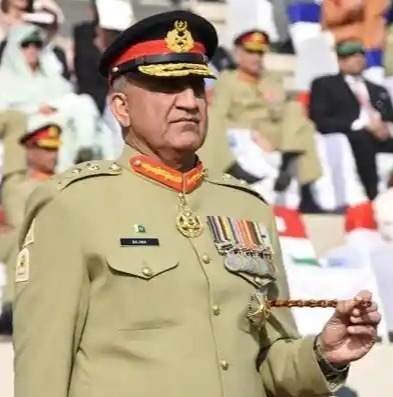Pakistani army chief General Qamar Javed Bajwa presided over a high-powered meeting of the Parliament's National Security Committee which was held on Thursday. The security establishment was present in strength, including heads of the ISI, ISPR–the publicity wing of the army, the head of military operations and senior position leaders.
Prime Minister Imran Khan was conspicuous by his absence, signalling that not everyone is on board General Bajwa’s initiative to improve ties with India following the February revival of the 2003 ceasefire accord between the two countries. Insiders told IndiaNarrative.com that the Pakistani military has not opposed Prime Minister Narendra Modi’s offer of re-establishing the Jammu and Kashmir assembly–a move that the PM made last week during a meeting with mainstream Kashmiri politicians.
Unsurprisingly, Bajwa briefed the high-powered assemblage about the situation in Kashmir, Afghanistan and internal security challenges.
Before the meeting, Pakistani Interior Minister Sheikh Rashid Ahmed said that the course of politics in Pakistan would change following a closed-door conclave, the daily Dawn reported.
Without giving any details, the minister said that Pakistan’s politics would now centre on the national security after the Parliamentary Committee on National Security receives the briefing on the situation in Afghanistan and other strategic matters.
The Parliamentary Committee on National Security has 29 members including the Pakistani army chief, the Prime Minister and all security chiefs including the ISI chief, Faez Hamid. According to Sheikh Rashid prior to the meeting, several political leaders have been invited, including leader of the opposition in the National Assembly, Shahbaz Sharif, leader of the Opposition in the Senate Senator Syed Yusuf Raza Gilani, Pakistan People’s Party (PPP) Chairperson Bilawal Bhutto Zardari, JUI-F Parliamentary leader Maulana Asad Mahmood, and ANP leader Ameer Haider Azam Khan Hoti.
The Information and Broadcasting Fawad Chaudhry said in a tweet that the meeting will be in-camera covering internal and external security matters. It will focus on Kashmir, Afghanistan and internal security challenges.

Earlier, the Army Chief said that Pakistan stands for peace within and all around, as it looks forward to acting as a bridge between regions.
Addressing the participants during his visit to National Defence University in Islamabad, he said spoilers of peace in Afghanistan risk regional instability.
Once again, he stressed a peaceful and durable solution of the Kashmir issue in line with relevant UN resolutions and aspirations of Kashmiri people.
People aware of the official state of play between India and Pakistan point out that army chief Bajwa is personally invested in carrying forward the budding effort to start normalisation of ties with India, following the revival of the 2003 ceasefire agreement between the two countries.
That explains why Pakistan has not attempted to thwart PM Modi’s bold initiative to offer revival of the Jammu and Kashmir assembly during talks with mainstream Kashmir leaders last week. “Usually, any such attempt would have triggered cross-border chatter with Kashmiri leaders discouraging to positively respond to New Delhi’s overtures. But none of that happened ahead of the PM’s crucial meeting,” the insider said, signalling that it is unlikely that military general headquarters in Rawalpindi will give up on building fresh momentum after the ceasefire revival.
Also Read: India unlikely to be provoked by Jammu drone strike from Pakistan




















